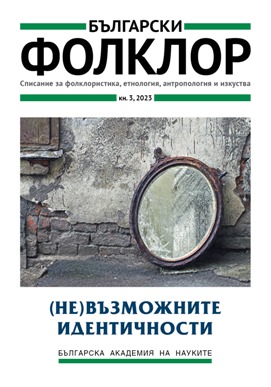Европейски измерения на съвременната идентичност на българските граждани
European Dimensions of the Contemporary Identity of Bulgarian Citizens
Author(s): Albena Nakova-Manolova, Vanya IvanovaSubject(s): Politics / Political Sciences, Politics, History, Anthropology, Social Sciences, Cultural history, Psychology, Political Theory, Governance, Sociology, Ethnohistory, History of ideas, Political history, Social history, Special Historiographies:, Political psychology, Politics and society, Cultural Anthropology / Ethnology, Culture and social structure , Social psychology and group interaction, Personality Psychology, History and theory of sociology, Methodology and research technology, Applied Sociology, Social development, Social differentiation, Social Theory, Crowd Psychology: Mass phenomena and political interactions, Policy, planning, forecast and speculation, Nationalism Studies, Post-Communist Transformation, History of European Union, Migration Studies, Inter-Ethnic Relations, EU-Approach / EU-Accession / EU-Development, Sociology of Politics, Globalization, Geopolitics, Politics and Identity, Identity of Collectives
Published by: Институт за етнология и фолклористика с Етнографски музей при БАН
Keywords: national identity; European identity; migration; globalization; Bulgaria
Summary/Abstract: The article is based on the results of a nationally representative sociological survey conducted in 2021 within the project “National and European Dimensions of the Contemporary Identity of Bulgarians” (KP06-H50/6/30.11.2020), funded by the Bulgarian National Science Fund. The transformations in the identity of Bulgarian citizens are traced in today’s world of increased mobility, migration and communication with representatives of other ethnicities and nations, which changes the meaning of national borders, eliminates the closedness of national cultures and leads to the formation of a consciousness of supranational or European identity. The analysis of the ongoing processes in the contemporary identity of Bulgarian citizens is based on the understanding of identity as a social construct which has relational and situational/contextual structure, determined by the nature of interaction with “others” and changing over time. The results show that although at this stage the national identity is the leading and determining one in the self-identification of the Bulgarian citizens, the processes of formation of the supranational/European identity have begun and represents an important part of their self-identification. Over 50% of all Bulgarian citizens have consciousness of belonging to supranational structures, i.e., we can talk about processes of formation of supranational identity; and in 30% of them it is a question of a declared consciousness of belonging to Europe, including the identification as citizens of the European Union.
Journal: Български фолклор
- Issue Year: XLIX/2023
- Issue No: 3
- Page Range: 391-411
- Page Count: 21
- Language: Bulgarian
- Content File-PDF

